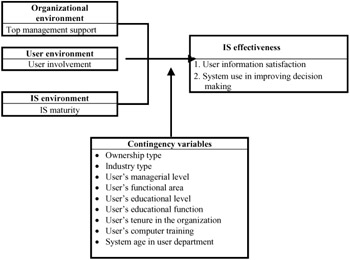Research Model and Hypotheses
|
| < Day Day Up > |
|
The Research Model
Organizational factors are believed to affect systems effectiveness (Cheney & Dickson, 1982). IS literature documents a number of efforts to provide a general framework that describes the potential impact of organizational factors on systems effectiveness. Further, a number of empirical investigations have established the potential influence of organizational factors (e.g., organizational size, degree of centralization, formalization, sufficiency of financial resources, top management support, user involvement, user training, IS maturity) on systems effectiveness.
However, the empirical evidence of the impact of the organizational factors on systems effectiveness is inconclusive (Yadav, 1985). As mentioned earlier, empirical evidence obtained from Western settings cannot necessarily be generalized to other countries where the social, economical, and cultural characteristics can be fundamentally different (Aharoni & Burton, 1994; Rosenzweig, 1994; Deans et al., 1991; Khalil & Elkordy, 1999, 1997).
To strengthen the external validity of Western evidence, especially its international dimension (Aharoni & Burton, 1994), it is imperative to reinvestigate these relationships in a different socio-economic and managerial environment than that of the previous studies. In addition, the investigation of these relationships has a particular importance in Egypt where the business environment is characterized by certain organizational practices and management style deficiencies such as centralization, bureaucracy, and limitations of financial resources. These organizational constraints might impede the appropriate climate to implement and use systems effectively.
Delone & Mclean (1989) recommend that the relevance of the variables to be included in a model depends on the objective of the study, the organizational context, and the aspect of IS addressed by the study. For the purpose of this study, three organizational factors-namely, top management support, user involvement, and IS maturity-and their possible influence on systems effectiveness are investigated. In addition, a number of situational and demographic characteristics of users are included in the research model as contingency variables. These factors and their hypothesized relationships to systems effectiveness are depicted in the research model (Figure 1).

Figure 1: Research Model.
The organizational variables of top management support, user involvement, and IS maturity are chosen in light of IS theoretical frameworks and prior research models and findings. Although these variables are believed to directly and/or indirectly influence systems effectiveness, the empirical evidence is either generally inconclusive or unavailable from developing countries like Egypt. As such, future research models on systems effectiveness were recommended to further investigate these organizational factors (e.g., Millet & Mawhinney; 1992; Taylor & Todd; 1995; Igbaria et al., 1997).
The nine external/organizational, personal/situational, and system characteristics are included as contingency variables in the research model because IS literature proposes they can possibly intervene in the relationship between the three organizational variables and systems effectiveness:
-
External/organizational: ownership type (private vs. public) (e.g., Raymond, 1990; Franz & Robey, 1986; Bretschneider, 1990; Robertson & Senevirante, 1995; Bretschneider & Wittmer, 1993) and industry type (e.g., Ives, Hamilton & Davis, 1981).
-
Personal/situational: user's managerial level, functional area, educational level, educational background, tenure in the organization, and computer training (e.g., Amoroso & Cheney, 1991; Igbaria et al., 1995; Cronan & Douglas, 1990; Sanders & Courtney, 1985; Fuerst & Cheney, 1982; Khalil & Elkordy, 1997).
-
System: system age in user department (Lee & Kim, 1992; Fuerst & Cheney, 1982).
|
| < Day Day Up > |
|
EAN: 2147483647
Pages: 207